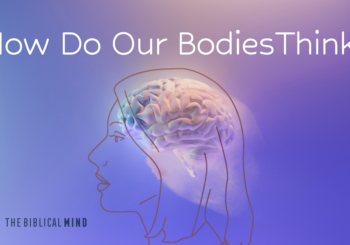Teaching Genesis’ Beautiful Vision in an Incarcerated Context
It’s Tuesday morning. I’m about to head out the door. With a wry smile, I say to my family, “I’m going to prison today.” My oldest daughter rolls her eyes and replies, “Well, I hope they let you out dad.” Since Fall semester 2019, I have had the privilege of teaching Old Testament and Hebrew at a medium security prison in North Carolina. The North Carolina Field Minister Program exists to grant incarcerated men a Bachelor of Arts in Pastoral Ministry (with an emphasis in counseling and psychology) and to train them for ministry in North Carolina prisons. Teaching Holy Scripture in this program is a dynamic experience. The Bible’s power to transform thinking and shape faithful living is undeniable. However, teaching Scripture in prison is also immensely challenging because the experience of incarcerated men often seems to contradict Scripture’s beautiful and hopeful vision. Indeed, everyone’s experience at one point or another seems to contradict the beautiful and hopeful vision of Scripture. How do I respond to this challenge in the prison context, and how might you respond to this challenge in your own engagement with the Bible?
Enjoying this article? Read more from The Biblical Mind.
There are three ways that I try to navigate this dilemma. First, I invite my students to think differently about their lives and to let Scripture shape their perspective. In Paul’s language, I invite them to “renew their minds.” Second, I show my students how Scripture portrays the ideal and the real. While the biblical authors outline the ideal way of life and narrate ideal human experiences with God and other humans, they’re also brutally honest about the harsh realities of life in this world. I aim to help my students live in the tension between the ideal and the real as it is presented in Scripture. Third, I encourage my students to persevere in hope. Even in a trying situation, they can be faithful to God and fruitful in the work that he has laid out for them.
Let’s take my class on the book of Genesis as a prime example of the tension between Scripture’s beautiful vision and the incarcerated experience. Unsurprisingly, I begin this course with a thorough exploration of Genesis 1–3. More than anything else, I want my students to see that Genesis 1–3 presents Israel’s God, YHWH, as the creator of a beautiful world that has been broken by human rebellion. YHWH’s creation is beautiful. YHWH’s beautiful creation has been broken. We explore these themes in Genesis 1–3 and then consider how their life stories reflect these realities. The reflection is immediate and obvious for incarcerated men. Many of them grew up in terribly broken environments. The personal and social turmoil that they experienced from birth is tragic. As they relay their stories, they quickly resonate with the theme of the brokenness of creation in Genesis 3.
However, I also want them to see that God’s creation was and is beautiful. Admittedly, this is a harder sell for many of them. My students continue to experience deep brokenness in prison. The trauma inflicted upon them from their youth along with the guilt and shame over their actions creates a mental and emotional prison in addition to the physical prison in which they live. The world is not bright and beautiful to them. It is dark and dismal. So, how do I encourage them to see the beauty of God’s creation? In three ways: by looking outside, by looking around them, and by looking in the mirror. Even in prison they can look outside and see the beauty of God’s good creation on a sunny day. Even in prison they can look around them and see a community of human beings to whom God gave the breath of life and whom God loves. Even in prison they can look in the mirror and see a man whom God loves, forgives, and is healing from his shattered past.
The Fall of Genesis 3 matches their experience, while Genesis 1–2 seems to contradict their experience. So, I invite them to see the world through the lenses of Genesis 1–2. I show them the tension between these chapters and ask them to live in the tension. I encourage them to persevere in hope. One day YHWH God will completely restore his beautiful creation.
Here’s another example of the tension between Holy Scripture and the incarcerated experience. Genesis 16 and 21 relay the story of Hagar. Hagar (lit. “the foreigner”) is a foreign slave subject to the whims of her mistress, Sarai. She produces a son for Sarai’s husband at Sarai’s demand (Genesis 16:1–4). She suffers intense abuse at the hands of Sarai due to Sarai’s jealousy such that she flees from Sarai while pregnant (Genesis 16:5–6). She returns and raises her son, Ishmael, only to be exiled by Sarah (who has been renamed by Genesis 21) because of some unacceptable interaction between Ishmael and Isaac (Genesis 21:8–14). Hagar’s story is the story of the vulnerable, oppressed foreigner. This is a story that many of my students can easily understand. Many of them grew up in vulnerable and oppressive environments. They resonate with Hagar’s suffering because they have also experienced profound suffering.
However, Hagar’s story is not simply the story of an oppressed, vulnerable woman. Ultimately, her story is the story of YHWH seeing and caring for her in her most vulnerable moments. YHWH sees Hagar in Genesis 16 (and she sees him in return!). God provides a well for Hagar and Ishmael in the wilderness in Genesis 21. The text then alludes to God’s provision for them throughout the rest of their lives when it says, “God was with the boy, and he grew up; he lived in the wilderness and became an expert with the bow. He lived in the wilderness of Paran, and his mother got a wife for him from the land of Egypt” (vv 20–21, NRSV)
God’s attention to and provision for Hagar and Ishmael challenges my students. In some ways, they struggle with this story because they doubt whether God really sees them or cares for them in prison. Due to their experience of oppression throughout their lives, many of them wonder if Hagar’s God is their God. They ask, “Does he really see and provide for me?” Again, I invite them to let the Hagar story renew their minds. Yes, God sees them. Yes, God provides for them. Yes, God will continue to see them and provide for them. I show them the tension between the ideal and the real. Though God does and will see and provide for them, sometimes (maybe even many times) they won’t feel his attention or provision. So, I encourage them to persevere in hope. One day they will perfectly experience God’s attention and provision and, like Hagar, they will even see God themselves.
One final example: Genesis 39 narrates Joseph’s experience in an Egyptian prison for a crime that he did not commit. Two themes dominate this narrative: YHWH was with Joseph and YHWH gave Joseph success in everything he did (even while he was in prison!). The relevance of Genesis 39 to my students is immediately obvious. After we study the literary shape and theological message of Genesis 39, I always leave time for the following question: Has this been your experience in prison? The answers are somewhat diverse, but the general sentiment goes something like this, “We know the Lord is with us. We can relate to Joseph in that way. But we have not experienced success like Joseph did.” I try to respond with a listening and sympathetic ear. The challenges of life in prison are many. I don’t wish to undermine this fact at all. At the same time, I want my students to consider their present situation. They are studying to receive a Bachelor of Arts in Pastoral Ministry which will equip them to become field ministers in prisons throughout the state of North Carolina. Upon graduation and deployment, they will have a massive influence on the lives of incarcerated men throughout the state. Because they are themselves incarcerated, they will be able to relate and minister to other incarcerated men in a way that no one else can.
Do you see what I’ve done there? I invited them to reconceptualize their experience. Perhaps their experience is more like Joseph’s than they initially thought. I showed them the tension between the ideal and the real. There’s no doubt that differences exist between Joseph’s experience in prison and their own. Nevertheless, there are tangible similarities that could function as a source of strength for them. I encouraged them to persevere in hope. God will use them in prison and God will one day release them from prison (in this life or the next) to rule and reign over the nations with Christ just as Joseph ruled over Egypt.
Everyone has experiences that seem to contradict biblical claims, and incarcerated people feel this tension acutely. The advice that I give my students is relevant for anyone struggling with the tension between Scripture’s beautiful vision and our broken experience. A faithful and receptive reading of Scripture will renew the human mind, teaching us to live between the ideal and the real and to persevere in hope that this beautiful vision will be fully realized in the eschatological age. Or in the words of a contemporary hymn, “Speak, O Lord, and renew our minds; Help us grasp the heights of your plans for us. . . . Speak, O Lord, till your church is built and the earth is filled with your glory.”
Image created by Rubner Durais
Subscribe now to receive periodic updates from the CHT.





